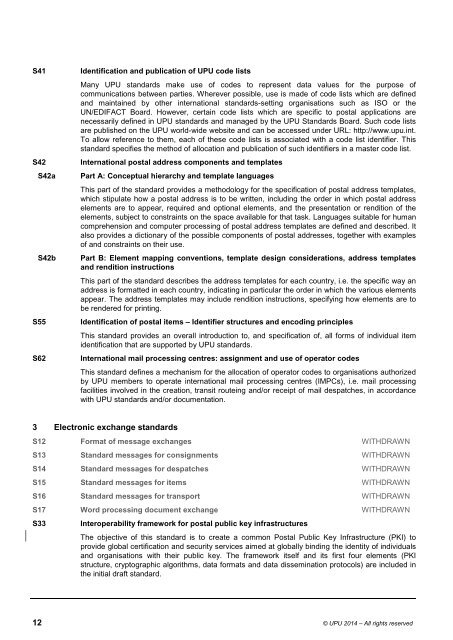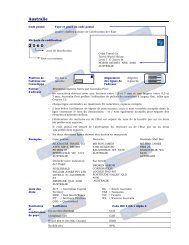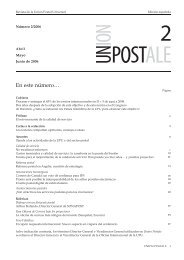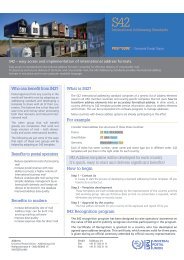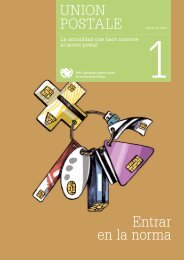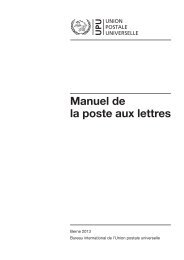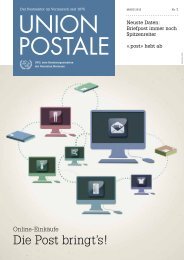Catalogue of UPU Standards - Universal Postal Union
Catalogue of UPU Standards - Universal Postal Union
Catalogue of UPU Standards - Universal Postal Union
You also want an ePaper? Increase the reach of your titles
YUMPU automatically turns print PDFs into web optimized ePapers that Google loves.
S41<br />
S42<br />
S42a<br />
S42b<br />
S55<br />
S62<br />
Identification and publication <strong>of</strong> <strong>UPU</strong> code lists<br />
Many <strong>UPU</strong> standards make use <strong>of</strong> codes to represent data values for the purpose <strong>of</strong><br />
communications between parties. Wherever possible, use is made <strong>of</strong> code lists which are defined<br />
and maintained by other international standards-setting organisations such as ISO or the<br />
UN/EDIFACT Board. However, certain code lists which are specific to postal applications are<br />
necessarily defined in <strong>UPU</strong> standards and managed by the <strong>UPU</strong> <strong>Standards</strong> Board. Such code lists<br />
are published on the <strong>UPU</strong> world-wide website and can be accessed under URL: http://www.upu.int.<br />
To allow reference to them, each <strong>of</strong> these code lists is associated with a code list identifier. This<br />
standard specifies the method <strong>of</strong> allocation and publication <strong>of</strong> such identifiers in a master code list.<br />
International postal address components and templates<br />
Part A: Conceptual hierarchy and template languages<br />
This part <strong>of</strong> the standard provides a methodology for the specification <strong>of</strong> postal address templates,<br />
which stipulate how a postal address is to be written, including the order in which postal address<br />
elements are to appear, required and optional elements, and the presentation or rendition <strong>of</strong> the<br />
elements, subject to constraints on the space available for that task. Languages suitable for human<br />
comprehension and computer processing <strong>of</strong> postal address templates are defined and described. It<br />
also provides a dictionary <strong>of</strong> the possible components <strong>of</strong> postal addresses, together with examples<br />
<strong>of</strong> and constraints on their use.<br />
Part B: Element mapping conventions, template design considerations, address templates<br />
and rendition instructions<br />
This part <strong>of</strong> the standard describes the address templates for each country, i.e. the specific way an<br />
address is formatted in each country, indicating in particular the order in which the various elements<br />
appear. The address templates may include rendition instructions, specifying how elements are to<br />
be rendered for printing.<br />
Identification <strong>of</strong> postal items – Identifier structures and encoding principles<br />
This standard provides an overall introduction to, and specification <strong>of</strong>, all forms <strong>of</strong> individual item<br />
identification that are supported by <strong>UPU</strong> standards.<br />
International mail processing centres: assignment and use <strong>of</strong> operator codes<br />
This standard defines a mechanism for the allocation <strong>of</strong> operator codes to organisations authorized<br />
by <strong>UPU</strong> members to operate international mail processing centres (IMPCs), i.e. mail processing<br />
facilities involved in the creation, transit routeing and/or receipt <strong>of</strong> mail despatches, in accordance<br />
with <strong>UPU</strong> standards and/or documentation.<br />
3 Electronic exchange standards<br />
S12 Format <strong>of</strong> message exchanges WITHDRAWN<br />
S13 Standard messages for consignments WITHDRAWN<br />
S14 Standard messages for despatches WITHDRAWN<br />
S15 Standard messages for items WITHDRAWN<br />
S16 Standard messages for transport WITHDRAWN<br />
S17 Word processing document exchange WITHDRAWN<br />
S33<br />
Interoperability framework for postal public key infrastructures<br />
The objective <strong>of</strong> this standard is to create a common <strong>Postal</strong> Public Key Infrastructure (PKI) to<br />
provide global certification and security services aimed at globally binding the identity <strong>of</strong> individuals<br />
and organisations with their public key. The framework itself and its first four elements (PKI<br />
structure, cryptographic algorithms, data formats and data dissemination protocols) are included in<br />
the initial draft standard.<br />
12 © <strong>UPU</strong> 2014 – All rights reserved


